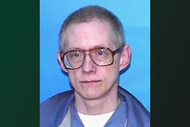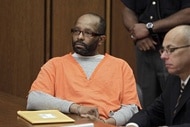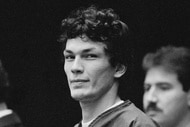Create a free profile to get unlimited access to exclusive videos, breaking news, sweepstakes, and more!
‘More Crafty Than Crazy:’ Serial Killers Sometimes Invent Alter Egos Like Golden State Killer’s ‘Jerry,' Expert Says
Sacramento County Prosecutor Thien Ho noted Joseph DeAngelo blamed an alter ego named "Jerry" for the murders he pleaded guilty to committing.

As prosecutors detailed the now-admitted Golden State Killer’s many crimes during a day-long hearing on Monday, one official noted that the serial killer contended that an alter ego named “Jerry” was what drove him to kill.
Joseph DeAngelo, 74, pleaded guilty to 26 murder, rape, and kidnapping charges on Monday. He also admitted to 62 uncharged offenses that he can no longer be prosecuted for due to the statute of limitations. The former police officer's crimes — which spanned across decades and multiple jurisdictions in California — went undetected for years until renewed attention was put on the case and genetic genealogy pointed to DeAngelo as the culprit.
Sacramento County Prosecutor Thien Ho noted in the courtroom (actually a Sacramento State University ballroom transformed into an ad-hoc courtroom due to both accommodation issues and coronavirus concerns) that when DeAngelo was arrested, he immediately blamed his crimes on a voice in his head.
“I did all that,” DeAngelo muttered to himself while alone in a police interrogation room, according to Ho's recounting on Monday. “I didn’t have the strength to push him out. He made me. He went with me. It was like in my head, I mean, he’s a part of me. I didn’t want to do those things. I pushed Jerry out and had a happy life.”
Authorities said DeAngelo killed 13 and raped nearly 50 people between 1975 and 1986 before abruptly stopping his murder spree. He then proceeded to live a seemingly normal life with a wife and children in Citrus Heights as his crimes went unsolved.
While DeAngelo initially uttered a seeming confession about an alter ego, he did not cooperate with authorities, and Ho hinted Monday that he believed DeAngelo was just faking the alter ego. Ho brought it up along with accusations that DeAngelo has been feigning poor health since his capture.
DeAngelo's demeanor Monday and voice appeared dramatically weak and confused. The prosecutor also noted that DeAngelo was spotted by investigators vigorously working in his yard before he was taken into custody "yet, sitting in the interview room he feigned feeble incoherence." Ho said DeAngelo pretended to suffer a heart attack and acted “crazy to avoid getting in trouble” after getting caught in 1979 for shoplifting dog repellent and a hammer.
Jennifer Carole, whose father, Lyman Smith, and stepmother, Charlene Smith, were bludgeoned to death by DeAngelo in 1980, told Oxygen.com on Tuesday that she doesn’t buy DeAngelo's "Jerry" defense either.
“It’s just hard for me to believe in this ‘Jerry’ thing,” she said. “It’s too convenient. If your alter comes forward, it’s usually not the minute you’re in jail. Your alter comes forward in other ways and I think his family would have seen it. “
James Alan Fox, a criminologist at Northeastern University and author of “Extreme Killing: Understanding Serial and Mass Murder,” agreed. He told Oxygen.com on Tuesday that if DeAngelo’s inner voice claim was genuine, other people who knew him over the years would have taken notice.
“It’s rare for serial killers to hear voices or have multiple personalities and the ones that do are usually caught fairly easily because of the level of confusion,” Fox said, adding that such an affliction would usually be part of a larger mental illness like schizophrenia. “The ones that stay at large for long periods of time have the ability and the cunning and the clarity of thought to carry out murders and cover them up so as to not be apprehended.”
Even though DeAngelo initially blamed a voice in his head, his attorneys did not pursue an insanity defense. But many other serial killers' defense teams have gone down that path.
Fox noted that DeAngelo would hardly be the first serial killer to pretend he heard voices. He pointed to “The Hillside Strangler” Kenneth Bianchi, who went on a killing spree with his cousin in California in the late 1970s.
Bianchi later claimed that an alter ego named "Steve Walker" was the force within him making him kill, according to “Introduction to Forensic Psychology: Research and Application.” A psychiatrist was able to determine that Bianchi fabricated the alter ego, along with other personalities.
“He tried faking having multiple personalities so that Kenneth Bianchi could be this nice guy everyone knew and then this other personality Steve Walker would be the one doing the killing,” Fox said.
Infamous killer Ted Bundy also claimed that there was an "entity" within him that drove him to kill. David Berkowitz, the “Son of Sam,” initially blamed his 1976 New York City killing spree on messages sent to him by his neighbor Sam’s demon-possessed dog.
Berkowitz later admitted that he faked the explanation, but the legend lived on. Despite the fact that many of these killers' stories have been debunked, the trope of serial killers hearing homicidal voices and possessing alter egos persists — think "Dexter's" so-called "Dark Passenger." Fox said that’s likely why killers like DeAngelo continue to cling to the defense.
“They’re more crafty than crazy, more bad than mad,” he said.
As for DeAngelo’s “Jerry,” Fox told Oxygen.com, “I am very skeptical of this. [...] I think in situations like this, you have to consider what advantage there might be for a perpetrator to make such a claim.”
In exchange for Monday's guilty plea, DeAngelo dodged a potential death sentence and a lengthy trial. Instead, he will serve 15 consecutive life sentences.
DeAngelo worked as a police officer in the mid-to-late 1970s in the California towns of Exeter and Auburn. It’s long been suspected that his job helped him learn how to stay off the radar. He even apparently committed crimes while on the clock — attacking couples in between writing up arrest reports, CBS 13 in Sacramento reported in January.
While working for the Exeter Police Department in 1976, he was even promoted to sergeant and put in charge of their burglary program, ABC 10 in Sacramento reported.




























